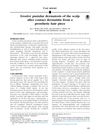 95 citations,
November 2016 in “Journal of The American Academy of Dermatology”
95 citations,
November 2016 in “Journal of The American Academy of Dermatology” Treatments for permanent hair loss from scarring aim to stop further loss, not regrow hair, and vary by condition, with partial success common.
 67 citations,
May 2018 in “Journal of Ginseng Research”
67 citations,
May 2018 in “Journal of Ginseng Research” Red ginseng may improve immunity, fatigue, memory, blood circulation, and menopausal symptoms, and is generally safe to consume.
 54 citations,
September 2012 in “Dermatologic Clinics”
54 citations,
September 2012 in “Dermatologic Clinics” Some medications can cause hair loss, but stopping the drug usually leads to recovery within 3 months.
 43 citations,
February 2008 in “Journal of cutaneous pathology”
43 citations,
February 2008 in “Journal of cutaneous pathology” Melanocyte precursors in human fetal skin follow a specific migration pattern and some remain in the skin's deeper layers.
 27 citations,
December 2015 in “Mayo Clinic Proceedings”
27 citations,
December 2015 in “Mayo Clinic Proceedings” The document concludes that lifestyle changes and medical treatments can significantly reduce symptoms of Hidradenitis Suppurativa, a chronic skin condition.
 24 citations,
March 2015 in “Dermatologic Surgery”
24 citations,
March 2015 in “Dermatologic Surgery” Home-use cosmetic laser and light devices show modest results for hair removal and acne treatment, but more research is needed for confirmation.
 22 citations,
March 2000 in “Clinics in Dermatology”
22 citations,
March 2000 in “Clinics in Dermatology” Many treatments for hair loss lack proper testing and FDA approval, so their effectiveness is uncertain.
 19 citations,
September 2011 in “Seminars in Cutaneous Medicine and Surgery”
19 citations,
September 2011 in “Seminars in Cutaneous Medicine and Surgery” At-home laser and light skin devices are less effective than professional ones, with limited scientific evaluation, but some show promise for wrinkles, hair growth, and acne.
 18 citations,
May 2020 in “Biomolecules”
18 citations,
May 2020 in “Biomolecules” Spironolactone, a heart and liver drug, has new uses including cancer treatment, viral infection prevention, and skin condition improvement.
 16 citations,
September 2018 in “Clinical Biochemistry”
16 citations,
September 2018 in “Clinical Biochemistry” The document concludes that more research is needed to fully understand the causes of PCOS.
 14 citations,
December 2020 in “Journal of The American Academy of Dermatology”
14 citations,
December 2020 in “Journal of The American Academy of Dermatology” More people, especially Hispanic/Latinx, in certain NYC communities experienced temporary hair loss during the COVID-19 pandemic.
 14 citations,
May 1988 in “The Journal of Dermatologic Surgery and Oncology”
14 citations,
May 1988 in “The Journal of Dermatologic Surgery and Oncology” The conclusion is that bilateral lateral scalp reduction has a high risk of severe complications, leading doctors to stop using it.
 11 citations,
August 2020 in “Dermatologic therapy”
11 citations,
August 2020 in “Dermatologic therapy” The document concludes that mesotherapy can be effective for skin and hair treatments, but more research is needed to confirm its safety and effectiveness.
 10 citations,
April 2018 in “Facial Plastic Surgery”
10 citations,
April 2018 in “Facial Plastic Surgery” The surgical technique of scalp advancement and pretrichial brow lift shortens the forehead and lifts brows, is good for women and transgender women with high foreheads, but not recommended for men and has some risks.
 10 citations,
May 2009 in “Sexual and Relationship Therapy”
10 citations,
May 2009 in “Sexual and Relationship Therapy” The document concludes that hormone therapy is essential for treating gender dysphoria, with specific drugs and monitoring protocols recommended for safety and effectiveness.
 9 citations,
March 2017 in “JAAD Case Reports”
9 citations,
March 2017 in “JAAD Case Reports” A woman's scalp condition improved with specific ointment after a hair piece caused skin issues.
 7 citations,
April 2012 in “Clinical investigation”
7 citations,
April 2012 in “Clinical investigation” Transdermal testosterone can improve sexual desire in postmenopausal women but lacks long-term safety data and is not FDA-approved for this use.
 7 citations,
May 2010 in “Journal of Dermatological Treatment”
7 citations,
May 2010 in “Journal of Dermatological Treatment” A man with multiple autoimmune diseases developed liver injury from azathioprine, but his liver improved after stopping the drug.
 6 citations,
September 2007 in “PubMed”
6 citations,
September 2007 in “PubMed” Stem cell niches regulate the number and function of stem cells in the body.
 4 citations,
January 2019 in “PubMed”
4 citations,
January 2019 in “PubMed” Patterned hair loss in women is linked to hormonal imbalances and biochemical changes, and should be evaluated for underlying health issues.
 4 citations,
May 2005 in “Seminars in Plastic Surgery”
4 citations,
May 2005 in “Seminars in Plastic Surgery” Carlos Oscar Uebel developed a hair transplant method that looks natural, has low risk, and shows full growth in 6-12 months.
 4 citations,
March 2002 in “Journal of the American Pharmaceutical Association”
4 citations,
March 2002 in “Journal of the American Pharmaceutical Association” The conclusion is that pharmacists are important in helping women choose the right skin care treatments.
 3 citations,
April 2011 in “Expert Review of Dermatology”
3 citations,
April 2011 in “Expert Review of Dermatology” Mesotherapy lacks strong evidence for effectiveness and safety, and its ingredients are not FDA-approved for subcutaneous use.
 3 citations,
July 1997 in “Current problems in dermatology”
3 citations,
July 1997 in “Current problems in dermatology” Hair restoration surgery has evolved over time, with a focus on natural-looking results and managing patient expectations, while also considering potential complications and the lifelong progression of male pattern baldness.
 2 citations,
January 2017 in “Clinical and medical investigations”
2 citations,
January 2017 in “Clinical and medical investigations” Herbal lotions are effective for severe hair loss, with a 64.8% success rate, but relapse is common and long-term management requires allergen control and possible corticosteroid use.
 1 citations,
March 2023 in “Nutrients”
1 citations,
March 2023 in “Nutrients” The conclusion is that obesity should be managed with a slow, balanced approach to diet and exercise, with medication and surgery as additional options, and education and access to care are important.
 January 2023 in “Revista Da Associacao Medica Brasileira”
January 2023 in “Revista Da Associacao Medica Brasileira” The document concludes that women's health needs a holistic approach, considering all life stages, promoting lifestyle changes, regular exercise, proper diet, and vaccinations, with health professionals playing a key role in education and guidance.
 February 2022 in “Journal of Armed Forces Medical College”
February 2022 in “Journal of Armed Forces Medical College” The patient with autoimmune hypothyroidism improved after treatment for thyroid and associated conditions.

The document suggests that drugs for prostate issues might cause lasting sexual, mental, and physical health problems due to blood vessel damage in the penis.
August 2018 in “Journal of the American Academy of Dermatology” Biotin treatment for hair, nail, and skin disorders has weak evidence and should not be recommended unless new research shows clear benefits.





























